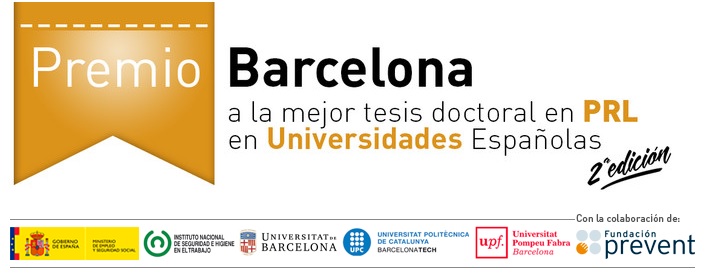The National Institute for Health and Safety at Work distinguishes a research paper on the influence of cultural beliefs on health
The National Institute for Health and Safety at Work distinguishes a research paper on the influence of cultural beliefs on health
The Barcelona Award for the Best Doctoral Thesis in Occupational Health and Safety has been given today to Sergio Vargas-Prada for his study on the role played by cultural beliefs on musculoskeletal pain.
Sergio Vargas-Prada has been granted the Barcelona Award for Best Doctoral Thesis in Occupational Health and Safety (OHS) for his work, Role of psychological and culturally influenced risk factors on symptoms and disability for musculoskeletal disorders. CUPID study (Spain), carried out during his doctoral degree in Biomedicine at Pompeu Fabra University. The award ceremony has been held today, 26 October, at the National Centre for Working Conditions Barcelona.
Vargas-Prada focused his research on the role of cultural beliefs on health, the tendency to report somatic symptoms, and mental health on musculoskeletal symptoms and disability related to them in a cohort of Spanish workers. According to his findings, individual psychological factors like the tendency to report somatic symptoms and self-perceived mental health, as well as those health beliefs that have a clear cultural influence, play an important role in the development and persistence of musculoskeletal pain. However, their influence is lower in the occurrence and concern of symptoms, and higher in causing disability.
“The results of this thesis reinforce the biopsychosocial approach on which strategies should be based for the prevention and management of disability associated with musculoskeletal disorders where psychological and social factors in addition to biological factors typically associated with musculoskeletal pain play a key role in the treatment and prognosis of the disease”, comments Vargas-Prada. “Negative beliefs about the causes of pain and prognosis, low morale and a tendency to report somatic symptoms could be considered potential targets for interventions to prevent disability caused by musculoskeletal pain. Due to the high cost of disability caused by musculoskeletal disorders on workers, employers and social security systems, the use of evidence-based practice should be considered a priority.”
 Sergio Vargas-Prada did his doctoral thesis at the Centre for Research in Occupational Health (CiSAL) of the Department of Experimental and Health Sciences at UPF, mentored by researchers Consol Serra, current director of CiSAL, and José Miguel Martínez.
Sergio Vargas-Prada did his doctoral thesis at the Centre for Research in Occupational Health (CiSAL) of the Department of Experimental and Health Sciences at UPF, mentored by researchers Consol Serra, current director of CiSAL, and José Miguel Martínez.
The Barcelona Award for the Best Doctoral Thesis in OHS is held annually to reward the best doctoral thesis on the subject of Occupational Health and Safety, passed during the last five years as of the date of the call and awarded cum laude. A committee appointed for each of the three specialties values the scientific contributions derived from these theses and select the best.
It is an initiative of the National Institute for Safety and Health at Work, Pompeu Fabra University, the University of Barcelona and the Polytechnic University of Catalonia, in collaboration with Prevent Foundation and it intends to contribute to study and research in safety and occupational health. This year, the award has been framed in the technical conference "Wealth of ages at work" organized by the National Institute of Health and Safety at Work and the Spanish Ministry of Employment and Social Security.
Treball de referència: Vargas-Prada Figueroa, Sergio. Role of psychological and culturaly influenced risk factors on symptoms and disability for musculoskeletal disorders. CUPID study (Spain).
